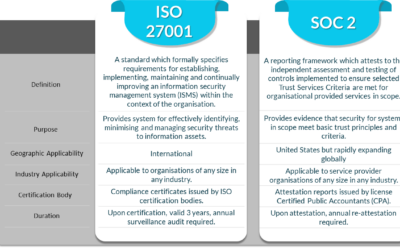In today’s hyper-connected world, the protection of sensitive information is of paramount importance. ISO 27001 Certification In New York, as well as globally, are under constant pressure to safeguard their data against breaches, cyberattacks, and other security threats. As businesses face increasingly complex security challenges, adopting industry standards for information security management has become essential. One of the most recognized and effective standards for managing information security is ISO 27001.
ISO 27001 is the international standard for Information Security Management Systems (ISMS), and it provides a framework for businesses to protect their information assets. Achieving ISO 27001 certification demonstrates an organization’s commitment to information security, risk management, and regulatory compliance. This article delves into the significance of ISO 27001 certification, its relevance to businesses in New York, the certification process, and how organizations can achieve and maintain it.
What is ISO 27001?
ISO 27001 is part of the ISO/IEC 27000 family of standards, which provides guidelines for managing information security. Developed by the International Organization for Standardization (ISO), ISO 27001 is designed to help organizations protect their sensitive information through the establishment, implementation, maintenance, and continuous improvement of an Information Security Management System (ISMS).
The standard covers a broad range of information security practices, including risk management, governance, access control, physical security, and data privacy. The goal of ISO 27001 is to help organizations ensure the confidentiality, integrity, and availability of information by implementing effective security controls and risk management processes.
ISO 27001 is designed for all types of organizations, regardless of their size, industry, or geographical location. Whether a company is in finance, healthcare, retail, or any other sector, ISO 27001 helps establish robust security measures that protect sensitive data and ensure business continuity in the event of security incidents.
Importance of ISO 27001 Certification for New York Businesses
New York is one of the leading business hubs in the world, home to numerous global corporations, financial institutions, technology firms, and healthcare providers. As such, businesses in the city face heightened security risks and regulatory requirements that demand robust information security management practices. Achieving ISO 27001 certification provides several key advantages for New York-based businesses:
1. Protection Against Cybersecurity Threats
Cyberattacks are among the most significant threats facing organizations worldwide. New York businesses, given their prominence and access to valuable data, are prime targets for hackers, cybercriminals, and other malicious actors. By implementing the ISO 27001 standard, organizations can build a comprehensive security framework that helps prevent data breaches, ransomware attacks, and other cyber threats. The risk management processes required by ISO 27001 ensure that businesses are prepared to identify, mitigate, and respond to security risks.
2. Regulatory Compliance
New York businesses must comply with a wide array of regulations that govern data protection and privacy, including federal laws like the Health Insurance Portability and Accountability Act (HIPAA), the Sarbanes-Oxley Act (SOX), and state-level regulations like the New York Department of Financial Services (NYDFS) Cybersecurity Regulation. ISO 27001 provides a framework for meeting these regulatory requirements by ensuring that businesses have implemented appropriate security controls and risk management practices.
Achieving ISO 27001 certification helps businesses demonstrate compliance with these regulations, reducing the risk of penalties and legal liabilities. ISO 27001 also helps organizations stay ahead of evolving regulatory requirements, ensuring they maintain compliance over time.
3. Building Trust with Clients and Partners

ISO 27001 certification is a recognized symbol of an organization’s commitment to information security and risk management. For businesses in New York, achieving this certification can significantly enhance their reputation and build trust with clients, customers, and business partners. It provides assurance that the organization has implemented best practices to protect sensitive information, whether it’s client data, intellectual property, or financial records.
Clients and partners are more likely to engage with organizations that can demonstrate a commitment to information security, making ISO 27001 certification an essential factor in building and maintaining business relationships.
4. Improved Risk Management
ISO 27001 requires organizations to perform a comprehensive risk assessment to identify, evaluate, and mitigate potential threats to information security. For businesses in New York, where the volume of sensitive data and the complexity of operations are high, this risk management approach is crucial.
By adopting ISO 27001, organizations can take a proactive approach to managing security risks, identifying vulnerabilities before they lead to security incidents. This approach not only protects the organization’s data but also helps mitigate risks to business continuity, financial stability, and brand reputation.
5. Competitive Advantage
ISO 27001 certification can provide a significant competitive advantage for businesses in New York. In an environment where data breaches and cybersecurity incidents are becoming more frequent, organizations that prioritize information security stand out from the competition. Being ISO 27001 certified demonstrates that a business is committed to protecting sensitive data and minimizing security risks, which can help attract new clients and customers.
For New York businesses involved in international trade, ISO 27001 certification can also help meet the security requirements of global partners and customers, expanding market opportunities and enhancing cross-border collaboration.
The ISO 27001 Certification Process
The process of achieving ISO 27001 certification involves several key steps, each of which is designed to help businesses establish, implement, and maintain an effective Information Security Management System. The process typically takes several months to complete, depending on the size and complexity of the organization.
1. Gap Analysis and Initial Assessment
The first step in the certification process is conducting a gap analysis and initial assessment. This involves reviewing the organization’s existing information security practices and comparing them against the requirements of ISO 27001. The goal is to identify areas where the organization’s current practices fall short of the standard and to create an action plan for addressing those gaps.
The gap analysis also includes a risk assessment to identify potential security threats and vulnerabilities. This process is essential for understanding the organization’s current security posture and establishing a baseline for the implementation of the ISMS.
2. Designing the Information Security Management System (ISMS)
Based on the results of the gap analysis, the next step is to design the Information Security Management System (ISMS). This involves developing policies, procedures, and controls that address the risks identified during the assessment. The ISMS should cover all aspects of information security, including data access, physical security, incident management, business continuity, and employee training.
The consultant or internal team responsible for implementing the ISMS should ensure that the system aligns with ISO 27001’s requirements and is tailored to the organization’s specific needs and risks.
3. Implementing Security Controls
Once the ISMS is designed, the next step is to implement the necessary security controls. ISO 27001 provides a comprehensive set of security controls, outlined in Annex A of the standard, which organizations can use to mitigate the risks identified during the risk assessment.
These controls cover areas such as access management, cryptography, physical security, and network security. The implementation of these controls should be done in a manner that integrates them into the organization’s daily operations and minimizes disruption to business activities.
4. Employee Training and Awareness

Employee training is a critical aspect of the ISO 27001 certification process. ISO 27001 requires organizations to ensure that all employees understand their roles in maintaining information security and comply with the organization’s security policies.
Training programs should cover topics such as data protection, password management, phishing awareness, and incident reporting. By fostering a security-conscious culture, businesses can significantly reduce the risk of human error and insider threats.
5. Internal Audit and Monitoring
Before applying for certification, businesses must conduct internal audits to assess the effectiveness of the ISMS and ensure that all security controls are functioning as intended. The internal audit process involves reviewing documentation, performing tests, and checking for any non-conformities or gaps in the ISMS.
Ongoing monitoring and evaluation are essential to ensure that the ISMS remains effective over time. ISO 27001 requires businesses to continually assess and improve their information security practices.
6. Certification Audit
Once the ISMS is fully implemented, the final step is to undergo the certification audit. This audit is conducted by an accredited third-party certification body that evaluates the organization’s compliance with ISO 27001. The audit typically consists of two stages: an initial review of documentation and a second stage that involves an on-site assessment of the organization’s security controls.
If the organization meets all the requirements of the standard, the certification body will issue the ISO 27001 certification. This certification is valid for three years, after which the organization must undergo a re-certification audit.
Maintaining ISO 27001 Certification
ISO 27001 certification is not a one-time achievement; it requires continuous maintenance to remain valid. Organizations must regularly review and update their ISMS to address new security risks, regulatory changes, and evolving business needs. Periodic internal audits and risk assessments are essential to maintaining compliance and ensuring the ongoing effectiveness of the ISMS.
Additionally, organizations must remain proactive in monitoring threats, training employees, and conducting regular security assessments. By embedding a culture of continuous improvement, New York businesses can ensure that they stay ahead of emerging cybersecurity threats and maintain their ISO 27001 certification for the long term.
Conclusion
ISO 27001 certification is an essential tool for New York businesses looking to enhance their information security, ensure compliance with regulatory requirements, and build trust with clients and partners. By implementing an Information Security Management System that aligns with ISO 27001, organizations can protect sensitive data, mitigate risks, and establish a robust security framework that supports long-term business success.



0 Comments